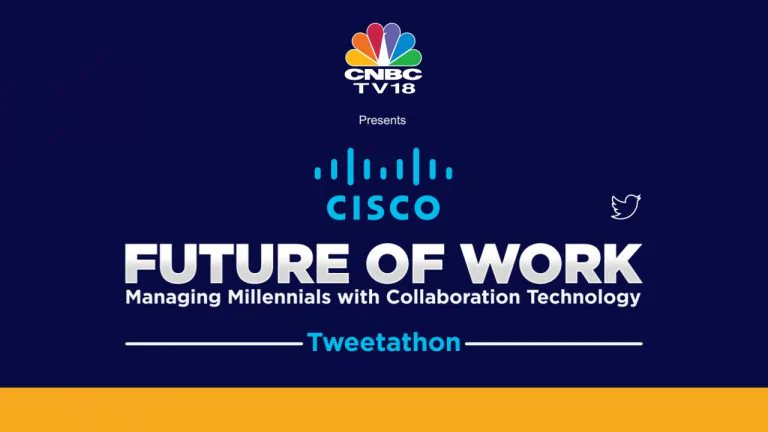Business continuity was put to the test with the pandemic-triggered lockdown. Workspaces were disrupted without much prior notice and tech-enabled collaboration tools became the lifeblood of businesses of all sizes, across the spectrum of industries.
Beyond deploying novel solutions to facilitate collaboration, corporates have begun to seek innovative ways to fuel employee productivity, expand sales and capacities, manage and secure data, among other core functions. Within this new normal, the priority for business leaders still remains ensuring business viability in the long run.
To explore the future of work and the ‘new normal’ and how technology adoption can shape up the modern workplace and help it meet the cultural shift of the workforce, using new age collaboration tools, CNBC-TV18, in partnership with Cisco Systems, set up a unique Tweetathon, themed “Future Of Work: Managing the Millennials with Collaboration Technology”.
Moderated by Mridu Bhandari of CNBC-TV18, the panel included Mohandas Pai, Chairman, Manipal Global Education; Nithin Kamath, CEO, Zerodha; Dr. Sayed Peerzade, Group CIO, Reliance Entertainment Group; Dr. Tanvi Gautam, MD leadershift Inc & HR influencer; Sudhir Nayar, Managing Director – Commercial Sales, Cisco India & SAARC; N Jayantha Prabhu, CIO, Essar Group and CP Gurnani, CEO & MD, Tech Mahindra, which was held on 26th June 2020 at 4pm, tweeted on the subject kept flowing at #CiscoFutureOfWork, with the panel and other participants raising relevant and thought-provoking issues revolving around the theme, while sharing their insights and experiences.
The event kicked-off with discussions on the how critical virtual collaboration technology tools were for managing workforces during the onset of the pandemic, which culminated in employees working from home and the challenges that still existed.
While most panellists shared that the transition went through fairly smoothly, their current challenges included maintaining the culture and morale of teams as they worked from home, dealing with stress levels and hiring virtually. Dr Tanvi Gautam pointed out that while tech has gotten businesses through round one, trust, morale and leadership would be the key to success in round two.
Sharing experiences of how disruptive tech could shape the workplace and workforce of the future, Jayantha Prabhu observed that cultural change would transform flexible working from a temporary fix to the new default way of working in the post-Covid19 scenario, especially since Millennials were digital natives and expected technology to be a part of their work culture. Dr Sayed Peerzade affirmed that the role of technology was becoming more important to connect the millennial workforce to a cause, allow them to complete meaningful work, while offering flexibility, open communication, progressiveness and most importantly, enabling them to witnessing leaders in action.
The discussions moved on to cover the benefits of technology and virtual collaboration on the ‘gig’ economy, promoting diverse workforces, employee productivity and cost savings. It also touched upon security issues that could arise when work goes virtual and how these could be circumvented.
Addressing concerns about training leaders in a virtual world, CP Gurnani explained that in his company, training was always virtual and appified. “We have a self-driven training programme and associates are encouraged to choose from a bouquet of offerings from our #NewAgeDelivery platform,” he tweeted.
Another leading concern was regarding creating enriching and engaging employee attraction and retention experiences in a digital first organisation. Mohandas Pai assured that by engaging employees in areas of their interest outside routine work and connecting them to business leaders these issues could be addressed. Tools help in interaction, but human connect virtually is the key, as Millennials need a more open culture, with greater interactions, he opined.
Sudhir Nayar endorsed that thought by tweeting, “Secure collaboration tools such as Webex can help you do pretty much anything you did otherwise – from celebrations – to meetings – to learning.”
The panellists did, however, finally concede that in this ‘new normal’ of a virtual world, they did miss some physical interactions – like spending time chatting with colleagues in the cafeteria or lawns over a cup of tea and grabbing delectable lunches with clients!
This is a partnered post.



















